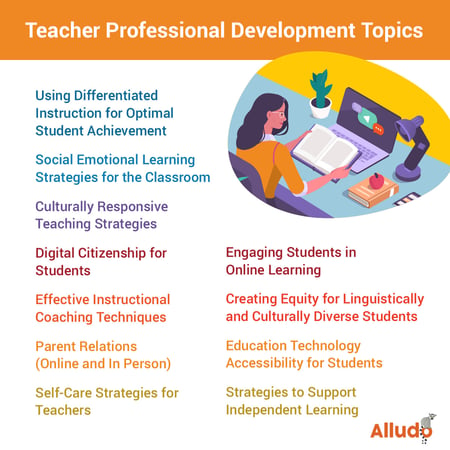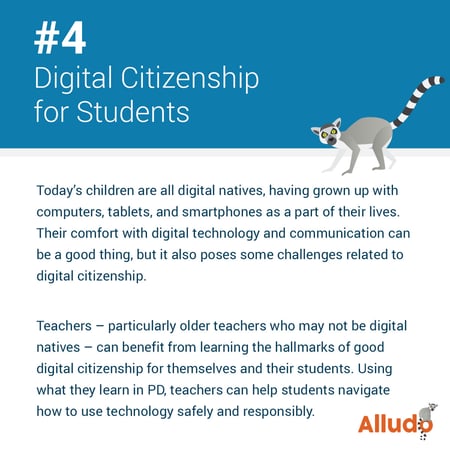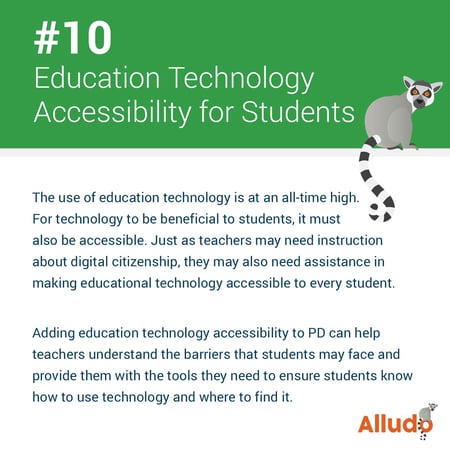5 min read
11 Learner-Centered Teacher Professional Development Topics for 2023
Damon Torgerson : Feb 16, 2022 5:00:00 PM

We now accept the fact that learning is a lifelong process of keeping abreast of change. And the most pressing task is to teach people how to learn. ~ Peter Drucker
Professional development for teachers is required in every school district and state, but that doesn’t mean that all professional learning is the same. It’s incumbent upon school districts and administrators to provide learner-centered teacher development both to encourage teacher participation and prioritize student outcomes.
At Alludo Learning, we partner with school districts around the country, helping them to develop a learner-centered environment for teachers, paraeducators, and administrators. It’s our job to provide a wide array of courses and lessons. Here are 11 learner-centered teacher professional development topics to consider in 2023.
Table of Contents
- What is Learner-Centered Teacher Development?
- 11 Learner-Centered Teacher PD Topics for 2023
- #1: Using Differentiated Instruction for Optimal Student Achievement
- #2: Social Emotional Learning Strategies for the Classroom
- #3: Culturally Responsive Teaching Strategies
- #4: Digital Citizenship for Students
- #5: Effective Instructional Coaching Techniques
- #6: Parent Relations (Online and In Person)
- #7: Self-Care Strategies for Teachers
- #8: Engaging Students in Online Learning
- #9: Creating Equity for Linguistically and Culturally Diverse Students
- #10: Education Technology Accessibility for Students
- #11: Strategies to Support Independent Learning
- Alludo’s Take
What is Learner-Centered Teacher Development?
Teacher development – and any other learning – may be centered on the instructor or the learner. Learner-centered teacher development puts the focus on teachers. Instead of dictating the terms of professional learning and asking teachers to comply, it asks teachers what they need from professional development and gives it to them.
Alludo Learning designs learner-centered professional development for school districts. We do it by encouraging teacher input, which gives teachers a voice and a choice both in what they learn and how they learn it.
Teachers tend to be more invested and engaged in professional learning when the focus is on providing them with hands-on skills that they can use in the classroom. Most importantly for school districts, the learner-centered approach increases teacher retention and improves student outcomes.
11 Learner-Centered Teacher PD Topics for 2023
The learner-centered approach to professional development requires school districts to get input from teachers and use what teachers tell them to provide professional development topics and courses that teachers want. That’s why we offer a wide array of topics for teachers. Here are 11 topics to consider for 2023.

#1: Using Differentiated Instruction for Optimal Student Achievement
Any teacher, on any given day, engages with students who are on different levels. It is unrealistic to expect that the same pedagogical techniques will work with a diverse group of students in the same way. In a single classroom, there may be students who meet the following criteria:
- Learning English as a second language
- Dealing with one or more learning disabilities
- Living in an at-risk environment
- Academically gifted
Differentiated instruction gives teachers the tools they need to optimize student achievement for every student, allowing them to meet students where they are and provide the attention and instruction they need to get to a positive outcome.
#2: Social Emotional Learning Strategies for the Classroom
Social and emotional learning (SEL) is getting a lot of attention, and rightfully so. Students need help learning how their emotions can inform their behavior. Getting in-class instruction on how to recognize and regulate emotions can be helpful, as can guidance on how to make good decisions even when emotions are involved.
Teachers can benefit from professional learning related to SEL and their students. Ultimately, students who are socially and emotionally educated are equipped to handle life’s challenges both in and out of school
#3: Culturally Responsive Teaching Strategies
One of the defining characteristics of most modern classrooms is cultural diversity. Students in the United States come from all over the world, speaking dozens of different languages and with different cultural touchstones. Teachers must learn how to navigate the waters of cultural diversity with ease if they want students to succeed.
Professional learning that focuses on culturally responsive teaching strategies provides teachers with the tools they need to bridge cultural differences, giving them classroom management skills and strategies to engage with students and bring them together.

#5: Effective Instructional Coaching Techniques
One of the most challenging elements of teaching is understanding that no two students are alike. While it would certainly make things easier if all students responded equally to the same teaching styles and techniques, any teacher can tell you that’s not the case. Some students need individual assistance.
Instructional coaching provides teachers with the tools they need to analyze where students are academically, develop teaching strategies to help them set realistic goals and expectations, and support students as they pursue their goals. It’s one of the PD topics that has the potential to help teachers the most.
#6: Parent Relations (Online and In Person)
Dealing with parents is something that every teacher must do and it can be challenging even when parent relationships are positive. Teachers are sometimes left to navigate parent relations alone. Adding parent relations as an option for professional development gives teachers the concrete tools they need to foster relationships with parents.
Ultimately, students will get to the best outcomes when their parents and teachers work in partnership. PD topics related to parent relations may include strategies for parent conferences, how to engage with parents online, and helping parents understand the role they play in their child’s school performance.
#7: Self-Care Strategies for Teachers
Teaching is a worthwhile and noble profession, but it can also be a stressful one. Teachers feel the weight of their responsibility to their students and may push their own needs aside in favor of helping their students.
Self-care strategies taught in professional learning can give teachers the tools they need to prioritize their health and well-being while also serving their students. Specific topics may include achieving a healthy work/life balance, how to manage stressful classroom situations, and how to use somatic self-evaluation to prevent burnout.
#8: Engaging Students in Online Learning
Online learning became the norm during the COVID-19 pandemic and is still a reality for many students. It is probable that some form of digital learning will continue to be required of students. Keeping kids engaged when they are not in the classroom requires teachers to adapt and incorporate new techniques.
Teachers can learn new methods and strategies to keep students engaged during remote learning. Instruction may include lesson design for online courses as well as strategies to help students who may experience feelings of anxiety or isolation during online learning.
#9: Creating Equity for Linguistically and Culturally Diverse Students
Students who grow up speaking a language other than English, or who come from culturally diverse households, do not have the advantage of being on a level playing field with those who are native English speakers. It’s incumbent upon teachers to do what they can to create equity in the classroom.
Instruction may include tools to help teachers recognize their own cultural biases and overcome them. They can then use what they learn to “clear the lane” for culturally and linguistically diverse students, providing them with a level playing field for learning.

#11: Strategies to Support Independent Learning
Great teachers understand that their job is ultimately to teach students how to think. That requires a curious mindset and an understanding of how to apply critical thinking to everything they learn, both in and out of the classroom.
Teachers can benefit from learning strategies to support independent learning. By helping their students understand how to learn, they can foster students’ pursuit of independent learning.
Alludo’s Take
Alludo Learning specializes in creating learner-centered professional development for school districts. We incorporate gamification and teacher choice to allow educators and administrators to learn the topics that are most helpful to them and their students.
A case in point is what happened with the Moriarty-Edgewood School District. Their primary goal was to provide teachers with training around digital literacy. We worked with them to create a Route 66-themed experience. Specific topics included the 21st century classroom, digital citizenship, and best practices for using technology in a transformative way.
Are You Ready to Transform Your Professional Development with Learner-Centered Topics?
The learner-centered approach to professional development works because it gives teachers a choice and a voice in what they learn. Most often, teachers prioritize topics that will elevate their classroom performance, leading students to the best possible outcomes.
Experience personalized learning for all levels of educators with a free trial of Alludo’s professional development platform. You’ll enjoy:
- Hundreds of core topics
- Asynchronous microlearning activities
- Timely and specific feedback
- Analytics that show learning impact
- Access anytime, anywhere
Earn Continuing Education Units with Alludo & Fresno Pacific University
Earn Continuing Education Units from Fresno Pacific University!


